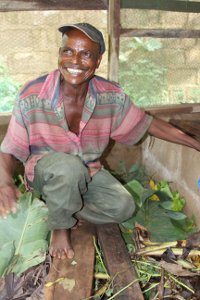For WCS to be successful in its mission to save wildlife and wild places, our conservation work must benefit people as well as animals. Directly or indirectly, we all depend on Earth’s resources for our livelihoods and our survival. People around the world fish, farm, log, and hunt for food, shelter, and other necessities for their families and communities. However, these resources are finite. If we harvest and use them in unsustainable ways, the resources we need will eventually run out.

In Nigeria WCS conservationists work with community leaders and members to develop ways people can use their land and water to generate income while promoting natural resource conservation. This work includes support for gorilla hunters to develop alternative livelihoods such as bee keeping and snail farming, the promotion of ecotourism, and investigating ways in which farmers can reduce levels of crop damage by marauding elephants (a significant problem for farmers surrounding Yankari Game Reserve for example). Investing in the current and future quality of life is the key to sound conservation practice.
![[ ]](/portals/139/Images/Livelihoods 1.jpg)
![[ ]](/portals/139/Images/Livelihoods 2.jpg)